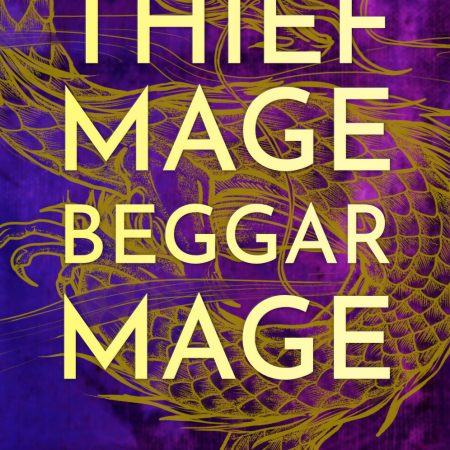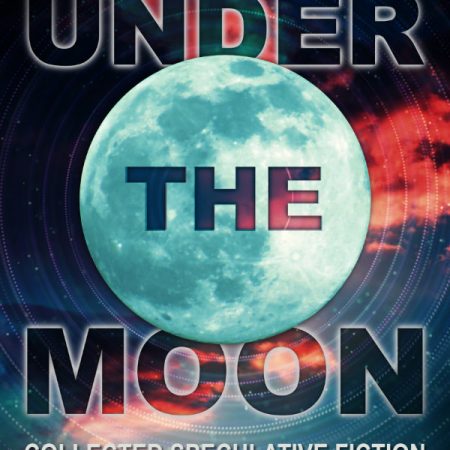Your basket is currently empty!
Comp titles – who needs them?

What on earth are comps and how are they used?
Recent social media controversies reveal a lack of understanding around comparison titles and how they could be problematic for marginalised authors. At Ghost Moth Press, we’ve been digging into this tricky subject
What is a comp?
They are “simply” a couple of other titles or authors that you can compare your own book with. So, when you see a book marketed as, for example, “A Long Way to a Small, Angry Planet meets Consider Phlebas” – that’s a comp. Or, “The Wind in the Willows as written by H.P. Lovecraft”. That kind of thing. But unfortunately “simply” is underselling the trickiness of choosing your own, especially if you’re from a marginalised community.
Comparison titles (comps) are often a bugbear for writers, second only to writing a synopsis. When querying publishers and agents, the frequent request for you to compare your own work with others can be bamboozling. Unless you set out to deliberately write a mash up of two or more famous works, how do you choose them? And are they even necessary? Opinion is divided and sometimes divisive. We’ll discuss the issues, and then give some helpful tips if you are struggling with comps.
(One of the) latest literary twitterstorms was about comps
A flippant tweet about the need for comps was made on the 15th of July 22, by a writer claiming that people who can’t figure out their comparison titles don’t read enough. This did not go down well, which is a shame, because further downthread there were some good ideas on how to go about it, such as researching using Amazon, or literature-map.com to find author similarities. However, the tone just did not work for many, and the failure to recognise difficulties for marginalised writers.
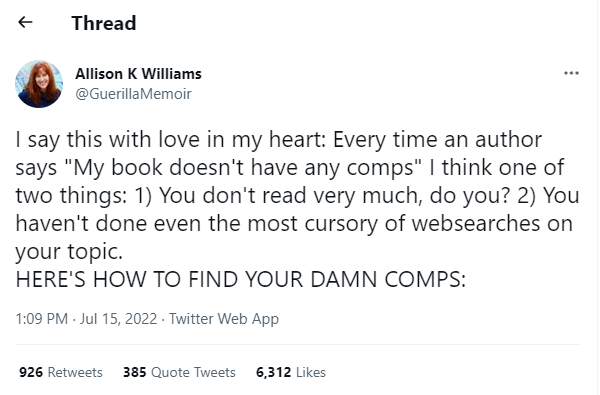
Big names weighed in to dispute this attitude, including K Tempest Bradford and C.L. Polk.
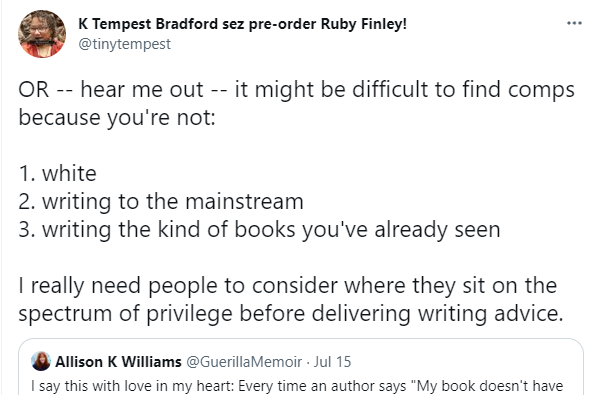
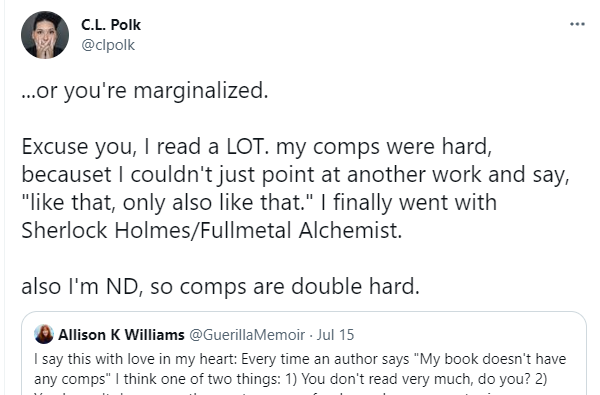
Comparisons, when submitting non-western or underrepresented works to a western agents can be difficult. Do you gamble that the reader knows which work you are comparing if you use a non-western comp title or author? Or perhaps there aren’t enough titles that represent your themes, such as LGBTQ+ or Neurodivergent themes. Should you offer a title that feels more familiar to the white / cishet / neurotypical etc audience at the sake of your real intentions? And what if your book is completely genre-defying?
Unfortunately, the answer often is that you must compromise to the dominant point of view where you are submitting. If a reader has no experience of your comp, then it will have no weight with them. But! There is some good news. More marginalised authors are filtering past the gatekeepers than ever, so you can use their books to compare with. Not enough yet, but many more than even a decade or two ago.
If, like our own authors, you have neurodivergence issues with comps, hopefully these ideas will help.
Some ideas for finding your own book comps
It’s not simple. But many agents or publishers ask for two or three comps to be included in your cover letter when submitting a manuscript. One reason is to place the books in their marketing environment for a better idea if they are sellable. So, appropriate signals are requested. It also increases anticipation from the reader, if the comps pique interest.
First, and this is especially important for ND authors, YOU DO NOT HAVE TO BE LITERALLY THE SAME AS YOUR COMPS. This is important. It is not “lying” if your plot or themes diverges from the comps you’ve chosen. It’s more about vibes than plot points. And, you can use the comp combination to modify the expectation to a better fit with your book, or add the concepts that are different. For example, “The Once and Future Witches but in a Wuxia setting” could be understood by most agents, unless they were totally uninterested in that kind of thing (and therefore a bad fit for you).
Choose popular titles that fit your feelings. Make them, if not bestsellers, good sellers. You are trying to entice people to spend money on the gamble that your book will sell. If no-one bought your comps, why would they buy your book? You may feel unsure about comparing yourself to someone who did well off their book. It’s a confidence barrier for so many people. You don’t want to come off as cocky. Instead go for what your ideal would be, if you had the best of opportunities. Listen, publishers will often put their own comps on the marketing material that will be completely different from yours anyway. Make it close as possible to where you want your book to go, but don’t sell yourself short.

Secondly, align with the genres, even if you don’t match exactly
If you submitted your Regency Romance entitled “Miss Cynthia’s Roses” and presented it as “Neuromancer x Jaws” may make a strong impression, but the wrong one. Those titles are nowhere near that subgenre’s market. Most readers in that market niche are not looking for blockbuster cyberpunk. And the title is a complete mismatch. “Persuasion meets Bridgerton” would work better. And if you have elements that don’t completely mesh with the genre, it could be fine, as long as you present them sympathetically. For example, if your Regency Romance has elements of SFF, why not “Bridgerton meets The Time Traveller’s Wife”?
Using titles that have a buzz right now is usually a good idea. If at least one of your two (or three) comparison titles are popular, it indicates there’s a market for it. So include one title or author that has had a hit in the last few years. You can still use titles that have long-lasting appeal for your others. For example, Lord of the Rings is a touchstone that most people recognise and still love, nearly fifty years on. But if both of your titles are old classics, that might work against you. Or, if they are too similar. It might show a lack of imagination or originality.
Other options include using authors’ names to compare your style of writing. For example, “for fans of Arkady Martine” is a way to compare your style and place it in the market. However, try not to choose big names that are huge brands in their own right, as it comes off as disingenuous. You will not be the next Neil Gaiman, Dan Brown nor should you want to be. You will be the first you! Use their books, if relevant, but not the authors themselves if they’re too big.
For writers who have underrepresented themes or styles, it is absolutely more difficult, and there is no getting away from that. You either bend to the dominant culture to which you are submitting your MS, or hope that they are more widely read. If their list of authors contains people writing about more diverse topics, you are much more likely that they will understand what you’re proposing if it’s outside the dominant culture.
The wrap up
The true star of your book is the words inside it at the end of the day. You are using comps merely as a tool to jimmy open a crack in that door so you can let them through.
Think outside the box. Look for comparisons in movies or TV if necessary. But make it something that shines!
The final word, however, should again be from K Tempest Bradford, as this is as good advice as we’ve ever seen for writers who are struggling with any of this crazy business: find your tribe, your community of book writers and book lovers who can support you along your way.
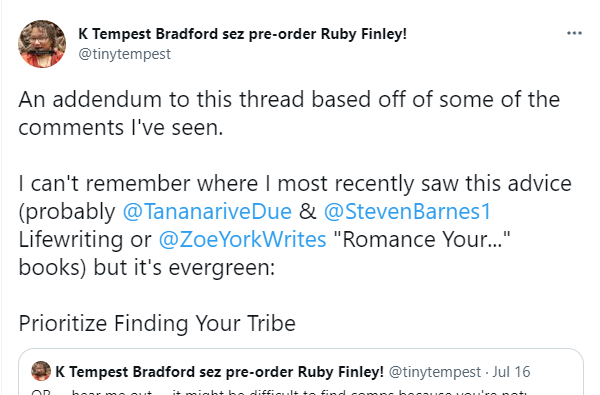
Are you a marginalised writer? Have you had a good or bad experience with comps? We would love to hear from you in the comments below.
Further reading and resources
https://www.literature-map.com/
https://authornews.penguinrandomhouse.com/comp-titles-an-elevator-pitch-for-your-book/
https://blog.reedsy.com/guide/how-to-write-a-query-letter/comp-titles/
https://www.janefriedman.com/how-to-find-compelling-comps-for-your-book/
https://selfpublishingadvice.org/the-ultimate-guide-to-comparison-authors-genres-and-tropes/
https://absolutewrite.com/forums/index.php?threads/trouble-finding-comp-titles.350993/

